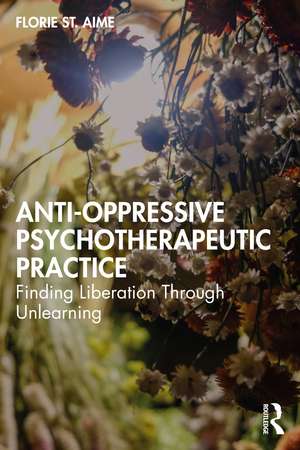Anti-Oppressive Psychotherapeutic Practice: Finding Liberation Through Unlearning
Autor Florie St. Aimeen Limba Engleză Paperback – 13 aug 2024
Written in an accessible and spiritual tone, chapters discuss the human need for connection as well as demonstrate the oppression through a social, neuroscientific, and biological lens as something that resides and can be passed on generationally. St. Aime interrogates the idea of the moral cloak symbiotic with whiteness and encourages readers to separate themselves from their profession to become a reflective rather than defensive clinician. She defines anti-oppressive practice as a clinical approach that considers the systemic, intergenerational, sociocultural and political influences on the lives of individuals and identifies the pillars of anti-oppressive practice as interconnectedness, interdependence, boundless curiosity, and vulnerability. With chapters including both experimental and practical exercises to use with clients as well as alone, this book encourages clinicians to undergo the process of unlearning the internalized oppressions that exist within themselves to change the therapeutic power exchange and provide the best care possible.
This book is essential reading for clinical social workers in practice and in training, as well as for psychotherapists, counselors, marriage and family therapists, and other mental health practitioners.
| Toate formatele și edițiile | Preț | Express |
|---|---|---|
| Paperback (1) | 210.06 lei 3-5 săpt. | +9.10 lei 4-10 zile |
| Taylor & Francis – 13 aug 2024 | 210.06 lei 3-5 săpt. | +9.10 lei 4-10 zile |
| Hardback (1) | 1094.14 lei 6-8 săpt. | |
| Taylor & Francis – 13 aug 2024 | 1094.14 lei 6-8 săpt. |
Preț: 210.06 lei
Preț vechi: 221.12 lei
-5% Nou
Puncte Express: 315
Preț estimativ în valută:
40.20€ • 42.07$ • 33.45£
40.20€ • 42.07$ • 33.45£
Carte disponibilă
Livrare economică 10-24 martie
Livrare express 21-27 februarie pentru 19.09 lei
Preluare comenzi: 021 569.72.76
Specificații
ISBN-13: 9781032074597
ISBN-10: 1032074590
Pagini: 182
Ilustrații: 2
Dimensiuni: 152 x 229 x 13 mm
Greutate: 0.25 kg
Ediția:1
Editura: Taylor & Francis
Colecția Routledge
Locul publicării:Oxford, United Kingdom
ISBN-10: 1032074590
Pagini: 182
Ilustrații: 2
Dimensiuni: 152 x 229 x 13 mm
Greutate: 0.25 kg
Ediția:1
Editura: Taylor & Francis
Colecția Routledge
Locul publicării:Oxford, United Kingdom
Public țintă
Postgraduate, Professional, and Professional Practice & DevelopmentCuprins
1. Welcome To The Is-Ness Part I. Disrupting Neocortical Supremacy 2. Historical Context 3. Scaled Up Societies Part II. Reconnecting to and Engaging the Limbic 4. Familial Execution 5. Personal Responsibility 6. Cultural Evolution 7. The Is-Ness Part II Part III. Practice Limbic Resonance 8. Shaping Cultural Evolution 9. Colluding with Liberation
Recenzii
"This book is an offering and intervention that unearths the brutal legacy of violent ideologies and practices underpinning the field of “mental health” while illuminating the path for mental health practitioners to reclaim our collective humanity. St. Aime takes us on a sacred journey of disruption, transformation and embodiment in this powerful work. May we commit to unlearning and divesting from oppressive systems to seed collective liberation."
Erica Woodland, LCSW founding director of National Queer & Trans Therapists of Color Network and co-author of Healing Justice Lineages: Dreaming at the Crossroads of Liberation, Collective Care, and Safety.
"Be ready for this extraordinary book to engage you in a way that others have not. Beneath its brilliant prose and broadly incisive analysis, this book offers an invitation into something even more profound: a new way of being present. While reading it, I felt an earth-rattling resonance with its spellbinding song of vulnerability, rootedness, heartbreak, unlearning, radical embodiment, and an utterly cleareyed sense of possibility. And I felt it throughout all of me. Something we deeply need waits within these pages."
Bill Brennan, PhD, author of EMBARK Psychedelic Therapy: A New Approach for the Whole Person
"Florie St. Aime is a pioneer in the mental health field. Any mental health professional who is willing to expand their awareness beyond traditional psychology will find the embodied concepts in “Unlearning” extremely useful as they hold a healing, liberating, sympathetic space for themselves and their clients."
Kylea Taylor, author of The Ethics of Caring, Founder of InnerEthics®
Erica Woodland, LCSW founding director of National Queer & Trans Therapists of Color Network and co-author of Healing Justice Lineages: Dreaming at the Crossroads of Liberation, Collective Care, and Safety.
"Be ready for this extraordinary book to engage you in a way that others have not. Beneath its brilliant prose and broadly incisive analysis, this book offers an invitation into something even more profound: a new way of being present. While reading it, I felt an earth-rattling resonance with its spellbinding song of vulnerability, rootedness, heartbreak, unlearning, radical embodiment, and an utterly cleareyed sense of possibility. And I felt it throughout all of me. Something we deeply need waits within these pages."
Bill Brennan, PhD, author of EMBARK Psychedelic Therapy: A New Approach for the Whole Person
"Florie St. Aime is a pioneer in the mental health field. Any mental health professional who is willing to expand their awareness beyond traditional psychology will find the embodied concepts in “Unlearning” extremely useful as they hold a healing, liberating, sympathetic space for themselves and their clients."
Kylea Taylor, author of The Ethics of Caring, Founder of InnerEthics®
Notă biografică
Florie St. Aime (she/her) is a Licensed Clinical Social Worker from Brooklyn, NY, and describes herself as a liberation-based clinician. She invites others into liberation practices through organizing/activism, group facilitation/workshops, counseling, holding sacred space and clinical supervision.
Descriere
This book supports mental health practitioners in showing how they personally intersect with oppression, helping them explore how it shows up in their practice and providing them with tools to offer anti-oppressive care.
